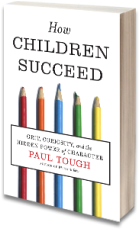You probably know by now the main message: what really counts for academic success is conscientiousness (or its close cousins, grit, or character or non-cognitive skills).
Tough intersperses explanations of the science behind these concepts with stories of students that he's met and followed. The stories add texture and clarity, and Tough is among a very small number of reporters who gets complex science right consistently. He takes you through attachment theory, the HPA axis, and executive control functions, all without losing his footing nor prompting glazing in the reader's eyes.
Tough also devotes considerable space to a fascinating inside look at how charter school mavens have thought about self-control, how their thinking has changed over time, and how their views square with the science.

First, there's what Tough calls the cognitive hypothesis--that academic success is driven primarily (perhaps even solely) by cognitive skills. The book suggests that this premise may be in error. What really counts is self-control.
But of course, you do need cognitive skills for academic success. In fact, Tough describes in detail the story of a boy who is very gritty indeed when it comes to chess, and who scales great heights in that world. But he's not doing all that well in school, and a teacher who tries to tutor him is appalled by what he does not know.
Self-control predicts academic success because it makes you more likely to do the work to develop cognitive skills. I'm sure Tough understands this point, but a reader could easily miss it.
Second, Tough closes the book with some thoughts on education reform. This section, though brief, struck me as unnecessary and in fact ill-advised. The whole book is about individual children and what makes them tick. Jumping to another level of analysis--policy--can only make this speculation seem hasty.
But these two minor problems are mere quibbles. If you have heard about "non-cognitive skill," or "self-control" or "grit" and wonder whether there's anything to it, you'd be hard put to find a better summary than How Children Succeed.
 RSS Feed
RSS Feed